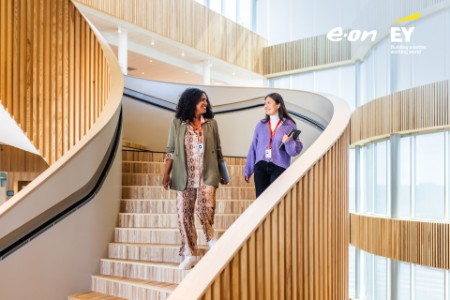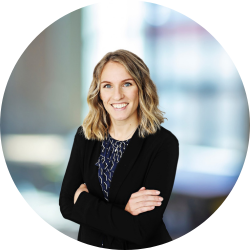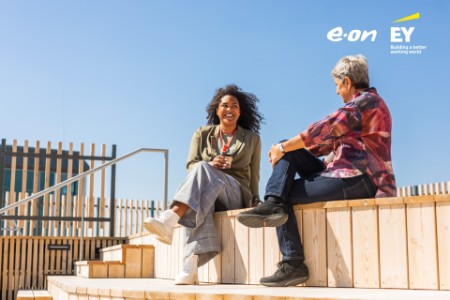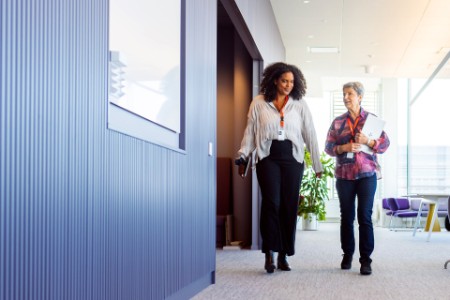Can workplace transformation aid sustainability and flexibility?
E.ON is an European energy utility company based in Essen, Germany, renowned for its presence in energy networks, infrastructure and customer solutions. Catering to around 48 million customers, E.ON is deeply passionate about driving sustainability through its projects and energy networks. E.ON’s head office at Malmö is aiming for a WELL certification, underscoring its commitment to sustainability and wellbeing.
The energy company's headquarters in the Nordics was initially situated in Malmö, consisting of three office buildings that they owned within the city — including a main building constructed especially for them, in the 1960s. The status and structures of the previous buildings made it difficult to provide a modern and flexible working environment. Research also revealed that their current space utilization was around 40%. While E.ON realized that these buildings required urgent renovation, a renovation on the scale needed was impractical from a financial standpoint.
As a result, they contemplated the consolidation of all three sites and the expansion of the existing main building. This approach would help them eliminate the geographical fragmentation that existed due to the three different locations, which hindered smooth interactions and necessitated travel for meetings. However, after careful deliberation, E.ON decided to make a strategic change to their plan — to forego the expansion of their current infrastructure and explore new possibilities, such as leasing a new space.
They reviewed multiple options before choosing a space close to Malmö central train station, an emerging area undergoing significant municipal development. Being located in the central business district, close to public transportation, would enable employees and clients to optimize their commutes and travel using sustainable means. The space resonated with E.ON's emphasis on sustainability and fit seamlessly with its commitment to reducing environmental impact.
By 2018, E.ON secured the lease agreement for the new space. But a bigger question remained: How will they activate and set up this new workplace sustainably and in line with what their people need today and in the future?

Leading transformation through continuous engagement
In the task of establishing a new modern workspace, E.ON sought support from an experienced partner. EY teams' proven success in executing similar future of work transformation projects, focusing on all things real estate, facilities management, technology and sustainability, positioned them as a reliable collaborator for E.ON's transformative journey.
The team from EY contributed with relevant experience within workplace transformations, efficient work methods and project management which was very valuable for us.
The significance of a united team approach was central for E.ON, evident in the project's title: "One Team One House." From the outset, the EY and E.ON teams shared a clear objective: to create a cohesive, flexible workspace embracing the concept of activity-based working.
Following were some of the key learnings that EY teams identified early on:
- Workplace transformation cannot be managed with existing departments, as the resources needed often surpass initial expectations, catching companies off-guard.
- E.ON's diverse workforce spans various roles, necessitating a comprehensive understanding of the change's scope and the diverse set of employee needs that can influence the new space and ways of working.
- As multiple teams collaborate, the challenge lies in fostering cohesion among disparate contributors, ensuring they operate seamlessly.
- Projects usually reveal more layers of transformation as they unfold. This necessitates a strategic approach to managing change, which is often underestimated.
Often, the underestimated complexity of change becomes evident when employees are in the process of transitioning. As they pack their belongings, myriad questions arise, accompanied by a surge of hands-on tasks during the transitional weeks.

Keeping this in mind, the EY approach was a blend of experience and adaptability. The approach was strengthened by EY teams’ local presence in Malmö, which set the stage for a more engaged partnership. During the project lifecycle, EY teams delved into various facets of E.ON's transformation — extending to the program management office and overseeing the project's structure, budget, timelines and reporting. Prior experience across similar projects enabled EY teams to address critical questions as they helped E.ON activate the new workplace.
EY teams also organized knowledge-sharing exchanges with former clients who had undergone the same transformative journey. Through inspirational workshops and collaborative efforts, EY teams fostered an environment where E.ON could glean insights from multiple perspectives.

Derive continuous value by improving the work experience
The highly flexible and dynamic synergy between E.ON and EY teams and the comprehensive range of competencies offered by the latter helped the teams navigate the intricacies of the project. A core aspect of the engagement was consistently keeping key personnel on-site, creating a sense of continuity and commitment. E.ON’s physical move into the new space took place in May 2023. Currently, the focus remains on assisting E.ON’s adjustment to the new environment.
We’re proud that our involvement goes beyond delivering the project and overseeing program management. We are physically present on-site, extending a warm welcome to employees in their new office space. This journey is an expedition we wholeheartedly embrace.
This assistance takes the form of aiding managers in coaching their teams to adapt to the novel working arrangements. This involves instructing them on how to optimally utilize the space and integrate the new way of working into their routines. While configuring the physical aspects like desks, partitions and layout is important, it is equally crucial to ensure that people understand how to harness these features effectively.
At E.ON we have a strong commitment to sustainability, and our new workplace aligns with our broader business strategy. Together with EY we have developed a future focused operational model for our workplace.
With sustainability and flexibility as major KPIs, E.ON now possesses the capacity to adjust the square footage they lease according to their needs, allowing them to adapt to changing needs in the organization and in the workplace.
Get in touch with us about your next future of work and workplace transformation!
The team
Contact us
Interested in the changes we have made here,
contact us to find out more.



